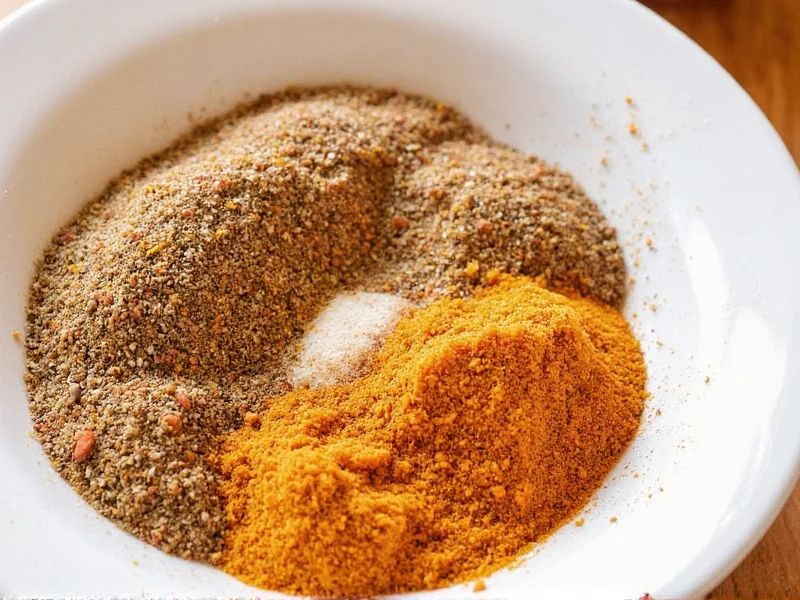Creating authentic Mediterranean chicken seasoning requires understanding both the components and their proper balance. This versatile spice blend captures the essence of coastal Mediterranean cooking traditions, where fresh herbs and simple seasonings enhance rather than overpower quality ingredients.
Essential Components of Mediterranean Chicken Seasoning
The foundation of any quality Mediterranean chicken seasoning consists of specific dried herbs and spices that work in harmony. Unlike many commercial blends that include unnecessary fillers, the authentic version relies on these core ingredients:
| Ingredient | Primary Flavor Contribution | Traditional Mediterranean Region |
|---|---|---|
| Dried Oregano | Earthy, slightly bitter, robust | Greece, Italy |
| Dried Thyme | Subtle minty, lemon notes | France, Italy |
| Dried Rosemary | Pine-like, woody, aromatic | Mediterranean coastal regions |
| Garlic Powder | Savory, pungent depth | Widespread throughout region |
| Lemon Zest (dried) | Bright citrus notes | Spain, Italy, Greece |
Creating Your Own Homemade Mediterranean Chicken Seasoning
When preparing Mediterranean chicken seasoning from scratch, the precise ratio of ingredients makes all the difference between an authentic flavor profile and a generic herb mix. The following proportions create a balanced blend that enhances chicken without overwhelming its natural flavor.
Basic Mediterranean Chicken Seasoning Recipe
This simple homemade Mediterranean chicken seasoning recipe yields approximately ¼ cup of seasoning blend:
- 2 tablespoons dried oregano (preferably Greek oregano)
- 1 tablespoon dried thyme
- 1 tablespoon dried rosemary, finely crushed
- 1 tablespoon garlic powder
- 1 tablespoon onion powder
- 1 tablespoon sweet paprika
- 1 tablespoon dried lemon zest (or 2 teaspoons lemon peel powder)
- 1½ teaspoons sea salt
- 1 teaspoon freshly ground black pepper
- ½ teaspoon red pepper flakes (optional for subtle heat)
Mix all ingredients thoroughly in a small bowl. For optimal flavor development, store the blend in an airtight container for 24-48 hours before using to allow the flavors to meld.
Using Mediterranean Chicken Seasoning Effectively
Understanding how to properly apply Mediterranean chicken seasoning makes a significant difference in your cooking results. Many home cooks make the mistake of either under-seasoning or applying the spices at the wrong time in the cooking process.
Optimal Application Techniques
For grilled or roasted chicken, use these professional techniques:
- Dry brining method: Combine 1 tablespoon seasoning per pound of chicken with ½ teaspoon salt. Rub mixture under and over chicken skin, then refrigerate uncovered for 4-12 hours before cooking
- For quick meals: Use 2 teaspoons seasoning per chicken breast, applying 30 minutes before cooking to allow flavors to penetrate
- With olive oil: Mix seasoning with high-quality extra virgin olive oil to create a paste that adheres better to chicken and prevents burning
Adapting Mediterranean Chicken Seasoning for Dietary Needs
One advantage of making your own Mediterranean chicken seasoning is the ability to customize it for specific dietary requirements while maintaining authentic flavor characteristics.
Common Variations
- Salt-free version: Omit salt and increase lemon zest to 1½ tablespoons. Add ½ teaspoon celery seed for depth
- Enhanced citrus profile: Increase lemon zest to 2 tablespoons and add 1 teaspoon dried orange zest for brighter flavor
- Smoky variation: Replace sweet paprika with smoked paprika for a subtle campfire note that works particularly well with grilled chicken
- Middle Eastern twist: Add ½ teaspoon ground sumac and ¼ teaspoon ground cumin for a flavor profile common in Eastern Mediterranean regions
Storage Guidelines for Homemade Seasoning
Proper storage maintains the potency of your Mediterranean chicken seasoning blend. Unlike commercial blends that contain anti-caking agents, homemade versions rely on proper storage to preserve freshness.
Store your seasoning in an airtight container away from heat and light. A dark glass jar or opaque container works best. Properly stored, homemade Mediterranean chicken seasoning maintains optimal flavor for 4-6 months. For extended storage, keep the blend in the freezer where it will retain quality for up to one year.
Check freshness by rubbing a small amount between your fingers and smelling. If the aroma is weak or musty, it's time to make a new batch. Never store seasoning above your stove where heat and moisture degrade quality.
Common Mistakes to Avoid
Even experienced cooks sometimes make these errors when working with Mediterranean chicken seasoning:
- Using fresh herbs instead of dried in the seasoning blend (fresh herbs contain moisture that causes clumping and spoilage)
- Adding the seasoning too late in the cooking process, preventing flavor development
- Over-applying the seasoning, which creates an unbalanced flavor profile
- Storing the blend in clear containers exposed to light, which degrades volatile oils in the herbs
- Mixing the seasoning directly with acidic ingredients (like lemon juice) too far in advance, which dulls the flavors
Perfect Pairings for Mediterranean-Seasoned Chicken
The bright, herbal notes of properly seasoned Mediterranean chicken complement specific side dishes and accompaniments. For authentic Mediterranean meal planning, consider these pairings:
- Lemon-herb roasted potatoes with fresh rosemary
- Cucumber-tomato salad with red onion and feta cheese
- Grilled vegetables (zucchini, bell peppers, eggplant) with olive oil and lemon
- Tzatziki sauce for dipping or drizzling
- Orzo pasta salad with Kalamata olives and fresh herbs
When planning your meal, remember that Mediterranean cuisine emphasizes fresh, seasonal ingredients. The seasoning should enhance the chicken, not dominate the entire dish.











 浙公网安备
33010002000092号
浙公网安备
33010002000092号 浙B2-20120091-4
浙B2-20120091-4